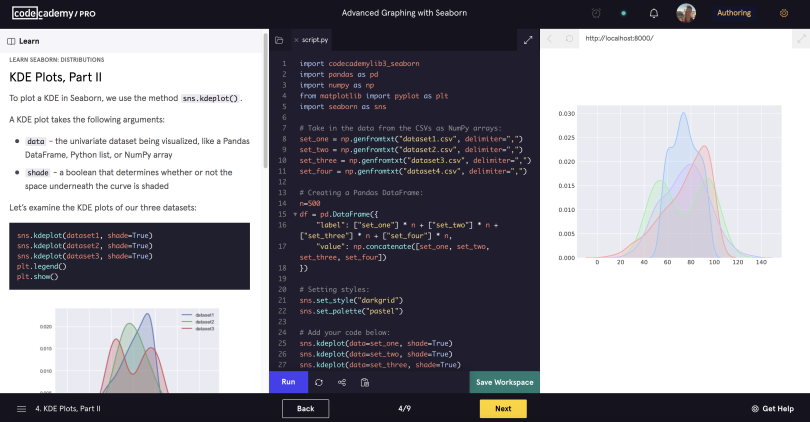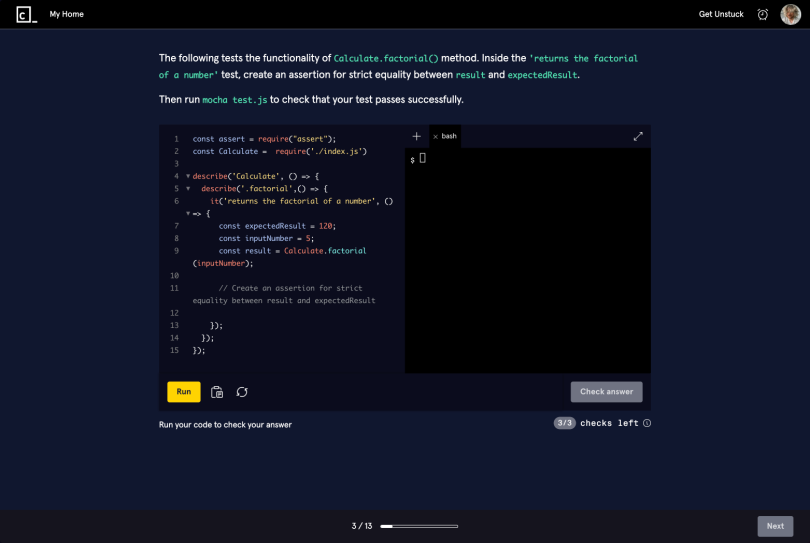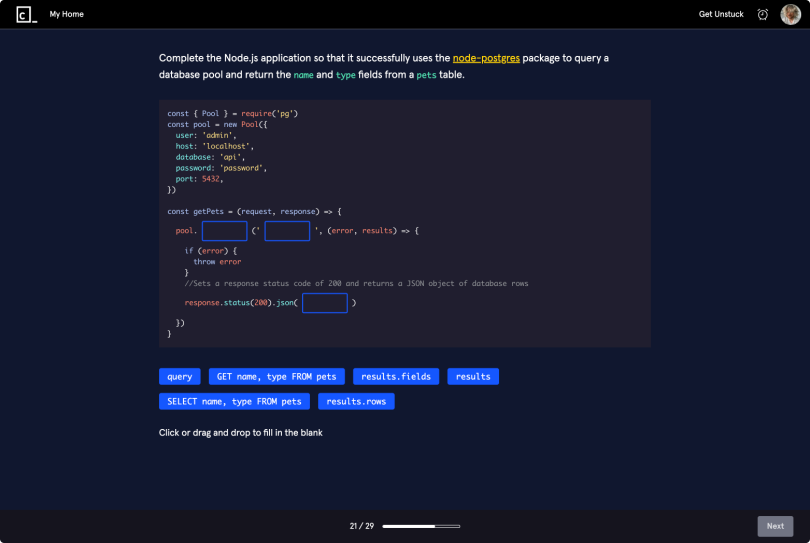To Kunal Ahuja of Codecademy, technology presents an approachable means of entry when it comes to realizing a career built for the long term.
“Future proofing for the 21st century is about scale. It's about a more affordable, more flexible, more interactive alternative to traditional options like a $10,000 bootcamp or a master's degree.” Ahuja said.
Ahuja is general manager, consumer, at Codecademy, which offers a wide variety of courses for users to pick up technical skills for roles in engineering, data science and other fields. According to its website, the company has had tens of millions of people turn to its solutions since its inception more than a decade ago, with material ranging from the ins and outs of C++ to popping the hood on natural language processing.
“It's about a more affordable, more flexible, more interactive alternative to traditional options like a $10,000 bootcamp or a master's degree.”
Building off a year that saw a Skillsoft acquisition, the business is leaning into 2023 with a handful of new product developments: Enhancements to its Codecademy Pro product, as well as the introduction of a new offering, Codecademy Plus.
The efforts — which officially go live mid-February — are the output of team members like Ahuja and his colleagues Sherry Li, director of product, consumer, and Zoe Bachman, curriculum director, consumer. Here’s what they had to say about the new releases.

Going ‘Pro’
The newest Codecademy Pro features include assessments, professional certification and career services. Assessments validate users’ mastery of the technical skill, according to Li. Once successfully passed, users get a certificate vouching for their proficiency in the relevant domain. For career services, Codecademy partnered with career platform Handshake to help learners connect to real employers during their job search.
Team members said that the features were largely informed by research about what students were aiming to get out of Codecademy.
“We saw a lot of people using the product to start a new career. We began to realize that building for a career-switcher, who wants to go from zero to one in a completely new job or role, is very different from someone wanting to snack on a course and pick up a practice skill,” Ahuja said. “That led to a difference in segmentation. We want to focus on each segment and what they want — versus this one product in the past that was being used for a myriad of different use cases.”
Li noted that, while the desire to get on a different professional track isn’t new, the features hope to speak to what users want at this moment.
“In the last couple of years, there's been a significant increase in career switching, and for different types of learning modalities,” she said, noting that she looks at metrics like feature adoption and code submissions from students as important markers of success of the team’s efforts.

The colleagues are particularly excited about assessments. While some kind of form assessments have always been part of Codecademy courses, the newly-minted ones provide a better opportunity for users to actually demonstrate skill competency in real-world environments. Unlike certificates of completion, Codecademy’s Professional Certifications are based on a learner’s ability to recall.
“It’s going to be a stronger learning experience,” Bachman said. “We know from learning science that it's not simply about the experience of taking in new material; it's proving out through applied experiences that you know it. Our assessment questions are designed in a way to enable learners to show that they can take the knowledge that they’ve learned and apply it in a lot of different contexts.”
Li shared Bachman’s enthusiasm for the new assessments, which come at the end of specific sections within a career path.
“Getting to the more rigorous, the higher-level assessments is really amazing,” Li said. “Ultimately, if you want to be a developer, you need to be able to create things from code that you can then use on the job. It's not about syntax, it's not about answering multiple choice questions. Being able to see learners pass our exams, which are a culmination of all the things they've learned, without a lot of the scaffolding that we do earlier in learning experience, is really important.”
The new features complement existing Pro features like career paths, which includes lessons and projects, as well as interview prep, aimed at getting individuals into certain fields (for example, the full-stack developer path includes lessons such as “Fundamentals of CSS” and projects like e-commerce app creation). Bachman said that paths — first introduced in 2018 — received a “really big facelift” a few years back to be more “career-focused, aligned with very specific jobs.” The newly-introduced work builds off of that foundation.
Team members hope that, in sum, the new features and capabilities help position individuals to future-proof their careers. And, as Bachman noted, that doesn’t just mean adding in-demand skills to one’s resume — but, at a fundamental level, being comfortable with the idea of change and growth as a result of having gone through Codecademy courses.
“It’s not simply learning the technology itself; it’s learning how to learn,” she said.


An Added ‘Plus’
The launch of new Pro features coincides with the official rollout of Codecademy Plus. Piloted last summer, Plus — which features normal Codecademy courses, as well as components like quizzes, projects and dedicated skill paths — is geared at people who want to upskill on the job, be that technically or non-technically.
“Codecademy Plus is really for people who may be a bit more advanced in career journeys and they're looking for smaller increments of learning as opposed to wanting to go from zero to one,” said Li.
Take, for instance, a product manager learning SQL to help run reports, or a front-end developer picking up the tools needed to go the full-stack route. And, as team members noted, with the rapid pace in change in the tools that professionals use in their roles, keeping up via upskilling is key.
Whatever the intent, Codecademy Plus seeks to equip people with the digital skills needed to stay competitive in their careers, both now and into the future.
“That’s how you keep on future-proofing your career,” Li said.
“That continuous learning is where Plus comes in.”
“From a curriculum standpoint, Codecademy historically has been known as a place to get started in your career, but we've been investing a lot more into our intermediate and advanced offerings,” Bachman said. “It's a place for you to continue to evolve your career — not just with features like code challenges, but with material that you would need to potentially learn on the job to strengthen your understanding of something like learning recommender systems in machine learning or more advanced topics in Java.”

The Codecademy Approach
According to Li and Bachman, a strong relationship between the product team and the curriculum team is particularly baked into the foundation of pedagogical rigor their offerings provide.
“Most people are used to working in the sort of traditional product-engineering-design triad,” Bachman said. “But we've come to recognize that when curriculum can be part of that product development experience, the offerings are so much stronger.”
“We've come to recognize that when curriculum can be part of that product development experience, the offerings are so much stronger.”
Beyond embracing collaboration and respecting one another’s domain expertise, Ahuja highlighted learning as a key component of Codecademy's company culture. The organization encourages team members to put themselves in the seat of prospective pupils.
“We respect the fact that a lot of people find coding and programming intimidating and they come to us as a starting point,” Ahuja said. “We treat that with a lot of respect. We don't take that trust for granted. We put a lot of thought into what we build.”








